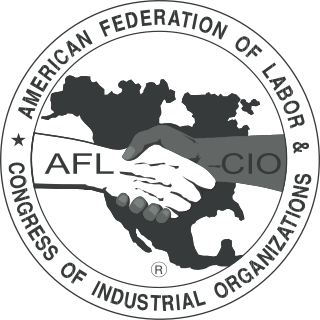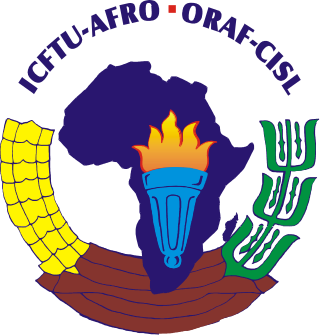Related Research Articles

The International Confederation of Free Trade Unions (ICFTU) was an international trade union. It came into being on 7 December 1949 following a split within the World Federation of Trade Unions (WFTU), and was dissolved on 31 October 2006 when it merged with the World Confederation of Labour (WCL) to form the International Trade Union Confederation (ITUC).

The American Federation of Labor and Congress of Industrial Organizations (AFL-CIO) is a national trade union center that is the largest federation of unions in the United States. It is made up of 60 national and international unions, together representing more than 12 million active and retired workers. The AFL-CIO engages in substantial political spending and activism, typically in support of progressive and pro-labor policies.

The World Confederation of Labour (WCL) was an international labour organization founded in 1920 and based in Europe. Fascist governments of the 1930s repressed the federation and imprisoned many of its leaders, limiting operations until the end of World War II. In 2006 it became part of the International Trade Union Confederation (ITUC), ending its existence as an independent organization.
Education International (EI) is a global union federation (GUF) of teachers' trade unions consisting of 383 member organizations in 178 countries and territories that represents over 32 million education teachers and education support personnel from pre-school through university. It is one of the world's largest sectoral global union federations.
The General Federation of Workers Trade Unions in Bahrain(Formerly known as the General Committee for Bahrain Workers) (GFWTUB) is a national trade union federation in Bahrain. It was established in 2002, by the Workers Trade Union Law granting workers the right to organize collectively.

The Oil, Chemical and Atomic Workers Union (OCAW) was a trade union in the United States which existed between 1917 and 1999. At the time of its dissolution and merger, the International represented 80,000 workers and was affiliated with the AFL–CIO.

The International Trade Union Confederation (ITUC) is the world's largest trade union federation.
Irving Brown was an American trade unionist and leader in the American Federation of Labor (AFL) and subsequently the AFL-CIO. Brown played a prominent role in Western Europe and Africa during the Cold War in splintering communist-led labor movements. Along with former Communist Party of the USA member Jay Lovestone, he founded the American Institute for Free Labor Development in 1962.

The ICFTU African Regional Organisation (AFRO) was a regional organisation of the International Confederation of Free Trade Unions (ICFTU), representing trade unions from countries in Africa.

The ICFTU Asia and Pacific Regional Organisation (APRO) was a regional organisation of the International Confederation of Free Trade Unions (ICFTU), representing trade unions from countries in Asia and Oceania.

The ICFTU Inter American Regional Organisation of Workers was the regional organization of the International Confederation of Free Trade Unions (ICFTU) for the Americas.

The Confederation of Shipbuilding and Engineering Unions (CSEU), often known as the Confed is a trade union confederation in the United Kingdom.

The Ghana Trades Union Congress is a national centre that unites various workers' organizations in Ghana. The organization was established in 1945.
Railway Labor Executives' Association (RLEA) was a federation of rail transport labor unions in the United States and Canada. It was founded in 1926 with the purpose of acting as a legislative lobbying and policy advisory body. At times, it played a prominent role in setting rail transport policy in the U.S., and was party to six U.S. Supreme Court cases. It disbanded in January 1997, with representation, collective bargaining, and legislative lobbying assumed by the newly formed Rail Division of the AFL–CIO Transportation Trades Department.
The Plantation Workers International Federation was an international trade secretariat of the International Confederation of Free Trade Unions. PWIF was founded at the firth ICFTU world congress held in Tunis in July 1957. Samuel Powell Claret was appointed as the general secretary of PWIF and Tom Bavin as its Director of Organisation. PWIF was launched by ICFTU to organize plantation unions in the Third World.
The Labor Congress of Liberia was a trade union centre in Liberia. It was one of the precursors of the Liberian Federation of Trade Unions (LFTU).
The United Workers Congress of Liberia was a trade union centre in Liberia.
Amos N. Gray was a Liberian trade unionist. Born in Pull River, Maryland County, Gray attended primary school in Pull River and secondary school in Harper. He attended college in Monrovia, studying social studies for two years and law for one year. During his college years he worked part-time at the Freeport of Monrovia. Working at the port in 1960, he joined the Maritime and Dock Workers Union. After his college years he worked at the Maritime and Dock Workers Union office in Monrovia.
The International Federation of Petroleum and Chemical Workers (IFPCW) was a global union federation bringing together trade union representing workers in the chemical and oil industries.
References
- 1 2 3 A. P. Coldrick; Philip Jones (1979). The international directory of the trade union movement. Macmillan. p. 297.
- 1 2 Martin Upham (1991). Trade Unions of the World. Longman Group UK Limited. p. 286.
- ↑ H. Boima Fahnbulleh (2004). Voices of Protest: Liberia on the Edge, 1974-1980. Universal-Publishers. p. 144. ISBN 978-1-58112-503-0.
- ↑ IFPAAW Snips. International Federation of Plantation, Agricultural and Allied Workers. 1977.
- ↑ AFL-CIO.; AFL-CIO. Constitutional Convention (1979). Proceedings of the AFL-CIO Constitutional Convention. AFL-CIO. p. 509.
- 1 2 3 International Confederation of Free Trade Unions (1983). Congress Proceedings. pp. 32, 187.
- 1 2 3 International Confederation of Free Trade Unions (1979). Report of the World Congress. pp. 24, 159.
- ↑ Social and Labour Bulletin. International Labour Office. 1980. p. 40.
- ↑ African Trade Union News. Regional Economic Research and Documentation Center. 1978. p. 90.